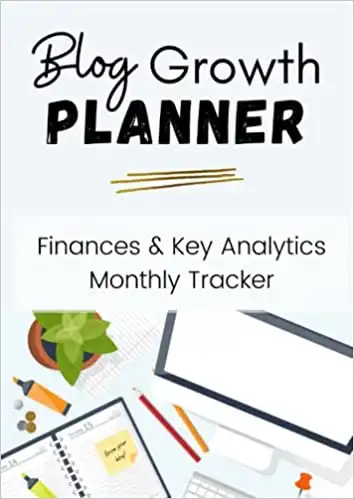How To Do Your Taxes as a Self-Employed Blogger or Youtuber
So you’re a UK-based blogger, influencer, Youtuber, content creator, or freelancer that started making money online with your side hustle. What now? How do you declare that income and pay taxes on it? How do you register as self-employed with HMRC? Or do you need to start a limited company?
We’ll explore all that in this post and in the Youtube video I filmed on this topic, as I’m hoping to give you the full blogger’s guide to HMRC and an understanding of how to do your taxes in the UK.
But first a super important disclosure: this is not meant to be construed as legal or financial advice. This post is just based on my experience and my understanding of the tax process in the UK.
I do recommend that you speak to a professional, whether it’s an accountant or an HMRC representative to make sure that this information is correct and up to date.
You’ll find all the information on the official HMRC website.
Please also note that this post contains affiliate links. But I personally use Go Simple Tax + the other tools mentioned and have done so for the last 5+ years, since I’ve been self-employed.
What you need to know about taxes as a UK blogger
As I’ve mentioned, I’ve been self-employed in the UK for over five years, running my blogging business – The She Approach. And I thought I would create today’s video/post to give you some peace of mind about the process of paying taxes in the UK and share some tips and tricks that I’ve learned along the way.
This guide to HMRC will be relevant to you no matter how you make money online, wheater that is with a blog, a Youtube channel, an Instagram or TikTok account, and so on.
If you started making more than £1,000 per year with your creative side hustle or business, you need to know this! And hopefully, I can answer some questions that are on your mind.
Do you need to start a limited company to earn online?
One of the most asked questions I get on this topic is “Do I need to start a business? Do I need to incorporate a limited company to be able to start blogging, or once I started earning money?“.
And the answer is no! You can if you prefer, but it’s an extra hassle and expense that you can avoid when starting a blog in the UK – especially in the first few years while you’re in the growing stage.
What you can do instead in the UK is to set up as a sole trader or self-employed. And you can do this alongside full-time employment or a part-time job.
When do you need to register as self-employed?
Everyone who lives and works in the UK gets a tax-free personal allowance of £1,000 per year.
Meaning that if you earn under that (in a financial year – that goes from April to April), you don’t need to declare it or register as a sole trader. And consequently – you don’t owe the HMRC any tax on that.
So if you run a small Instagram account or blog, you don’t have to worry about it yet.
However, once you pass the £1,000 per year income mark (that is all revenue – not deducting expenses), you need to officially register as self-employed with HMRC.
Just follow the link above, and go through their process. It’s quick and easy!
What to do once you’re registered as self-employed?
Once you’ve registered with HMRC, they will ask you to submit self-assessment records once a year – and we’ll go over that in a bit more detail later on.
But you get some time to do so from the time you register until the next self-assessment deadline, which is usually the last day of January for the last year ending in April.
For example, if you registered right now, you have until 31 January 2023 until your first report is due.
So, what should you do in the meantime?
Keep records of your blogging income & expenses!
The most important part of this is that you keep exact records of your business expenses, income, profit and so on. Your self-assessment report should contain exact numbers of everything you’ve earned as a blogger.
HMRC will then automatically calculate your taxes due (and I’ll share a bit on how they calculate that), once they subtract your overall business expenses.
So keeping track of everything you get paid, as well as everything you spend on your blog (hosting, stock photos, business travel, freelancers, tools & software, camera equipment etc) is crucial!
For that you usually need to save & store:
- The date of the transaction
- The amount
- A quick description
- The invoice or transaction number
- The type of transaction (income or expense)
- A PDF invoice or receipt saved separately in a folder
You can do this in a number of ways – all that matters is that you’re organized with it and you keep accurate records. You can either:
1. KEEP DIGITAL RECORDS
Because I’ve been doing this for years, I’ve actually developed a blogger’s income tracker spreadsheet. And you can grab and use my exact template!
This will automatically calculate all monthly and yearly earnings, deduct & track expenses, and predict how much tax you’ll need to put away each month to pay the tax man later in the year.
And you can duplicate and use it again year after year!

2. KEEP PAPER RECORDS
Alternatively, you can keep track of the same transactions (both in and out), in a notebook or planner.
And luckily for you, I’ve just launched my Blogging Planner that has dedicated pages for each month to help you track all earnings, overall profit, alongside some bigger blogging goals (like traffic and followers)!
Why you need to know when you make money as a blogger
Unlike regular employment, bloggers don’t get one paycheck a month. You don’t even get paid in just one way – you get paid in a multitude of ways. And it never comes around the same time every month.
So you need to keep close records of everything that you get paid into your account, related to your blog, social activity, or creative business.
You can start a new bank account just for your blog or business, but it’s not a necessity as long as you’re organized.
Keeping track of everything also helps you deduct your business-related expenses, meaning you will pay less tax. So it’s worth the hassle!
How much tax will I pay as a UK blogger?
How much tax you will pay, will depend on how much you earn.
Unlike regular employment, where your tax gets paid out of your paycheck, so you never even see it, when you’re self-employed you have to keep track of your profit and pay HMRC tax out of pocket.
That means you also have to predict how much you’re gonna have to pay in taxes every year and put that money aside. (Trust me – you don’t want to be faced with a payment deadline, only to discover you have no more money left in your bank account because you saw it as extra spending money.)
My income + expenses tracker automatically calculates tax due, which is an estimated 15%. I recommend putting away 15-20% each month for tax purposes.
What blogging expenses can you claim when you’re self-employed?
You will notice that my process is to put away 15% of the PROFIT for taxes, and not of the total revenue.
That’s because HMRC only charges an income tax on your gross profit and not the net income. That means your blogging-related expenses are tax-deductible.
Any blogging expenses that you do have, like hosting, marketing, ads, paying for freelancers, plugins, blogging courses, and other tools are deductible.
Check with HMRC what is an allowable business expense, because if you use something for personal use as well, you might not be able to declare that as an expense.
For example – if you buy clothes that you’re gonna take Instagram photos in, but you’re also gonna wear those clothes in your regular life you cannot claim those as expenses. The same goes for lunches or food (even if you take a photo first), or travel for leisure.
How To Submit Your Blog Earnings To HMRC
You’ve registered as a sole trader, kept track of your income and expenses, and now it’s time to report them to HMRC. You only need to do this once a year by submitting an online (or paper) tax return.
This will be a detailed account of your earnings and expenses, alongside your personal details.
For the financial year April 2021 – April 2022, you have until January 31, 2023, to submit this and pay your tax bill. This will be calculated and communicated to you by HMRC, usually within 72 hours of submitting your tax return.
For April 2022 – April 2023, the deadline will be January 2024, and so on.
Submitting Your Self-Assessment Tax Return – The Easy Way!
Submitting your tax return basically involves importing all that information that you have saved in your spreadsheet and summarizing it that either a private accountant, who can file on your behalf or by using an HMRC approved tax software.

I personally use Go Simple Tax – and I’ve done so for years. They make it extremely easy to categorize your income and income sources (so they have different tabs if you also have a full or part-time job, alongside your blog), and also add your expenses in the allocated expenses and allowances offered by HMRC.
But by far, the most helpful thing they do is the fact that they create and submit your tax report directly to HMRC on your behalf!
>> Try Go Simple Tax & sort out your self-assessment reports here!
You can also get it checked by an accountant if you’re unsure, and need a little more guidance, but I’ve been using them for years without any issues!

Here’s an example of what your dashboard will look like. From here it will take only 2 clicks to submit your final numbers to HMRC – quick, easy and painless!
That means you don’t have to log in, deal with HMRC’s slow website and fill out any complicated paperwork – they literally do it all for you.
How is tax calculated for bloggers in the UK?
If you’re wondering how the tax is calculated, and want to make sure you put enough away to meet your deadlines, here are a couple of tips that will help you prepare in advance:
- You only pay tax on your profits. So you get taxed income tax on all income, minus the expenses.
- You get £12,570 per year in tax-free personal allowance. No income tax is charged on this.
- Income tax is 20% for earnings between £12,571 to £50,270.
- If you earn over £50,271 and up to £150,000, you get charged 40% income tax on every pound after. (So don’t worry, you won’t get taxed 40% on all of it.)
- You also need to pay National Insurance on top of income tax. Use this NI calculator to estimate how much you’ll need to put aside for that.
- This is all calculated for you once you submit your annual tax records – just log into your HMRC account here.
If you use another tax software, they might estimate your tax due, but be sure to check your HMRC account or the annual letters they send out for the exact figures. And don’t worry – if you overpay, you get refunded.
If this is a bit confusing, here are a few calculations in practice:
| TAX CALCULATIONS | BLOGGER 1 | BLOGGER 2 | BLOGGER 3 |
|---|---|---|---|
| Total Income Generated | £15,000 | £30,000 | £55,000 |
| Allowable Expenses | £1,000 | £10,000 | £15,000 |
| PROFIT | £14,000 | £20,000 | £40,000 |
| Personal Tax-Free Allowance | £12,570 | £12,570 | £12,570 |
| TAXABLE INCOME | £1,430 | £7,430 | £27,430 |
| Income Tax Due | £286 | £1,486 | £5,486 |
| National Insurance Due | £532 | £1,252 | £3,652 |
| Total Tax Bill (Estimate) | £818 | £2,708 | £9,138 |
The Money Saving Expert blog also has a great tax calculator that you can use to predict your next tax bill, based on how your year and profit are going so far.
Payment On Account Explained
After your first year as a self-employed person, you might also notice an additional tax added to your bill or balancing payment – something called a payment on account.
This means that you need to pay half of your tax bill, twice a year. And sometimes you need to do so for the following year as well because they predict you will earn the same.
These payments are due on:
- 31 January
- 31 July
HMRC explains payment on account further here, but the takeaway is that you will usually need to pay your bill twice a year. So budget and plan for that!
Outsourcing Your Accounts
If you don’t want to handle the headache of doing all of this by yourself, you can also hire an accountancy firm – I recommend OSOME. They handle and submit the annual reports for you, do your bookkeeping and accounting, get you the best savings rates on your taxes, verify what you can claim as expenses and a lot more!
This applies if you decide to start a limited company, in which case the accounting side of things gets a little bit more complicated, so you will need all the help you can get.
Best bookkeeping and accountancy services for bloggers and small online businesses in the UK!
They are the accountancy firm that I use for my other blog & e-commerce business, where I am registered as a Limited Company (an LTD) in the UK, and they have been tremendously helpful!
So again – very different legal structures and entities for different purposes. If you’re simply a beginner blogger and this is more of a side hustle, you can still remain as self-employed and hire them to do your self-employment records for you.
Final Words On How To File Taxes As a UK Blogger
I hope this answered all your questions or at least provided you with some information to start looking a little bit more in-depth into your finances.
If you’re just starting your blog, don’t put this off for too long. It’s important to be informed and know exactly how much tax you’re likely to have to pay soon, rather than have the taxman knock on your door and be unprepared.
And of course, if you have any follow-up questions, let me know in the comment section. But if you need professional help, I highly recommend using:
- Go Simple Tax to submit your self-assessment tax records or
- OSOME team of accountants for more complex accountancy needs.
As I mentioned, I personally use them both and pay for them myself – and they are so worth it! Bonus: you get to claim both on your expenses as well!
If you were reading this out of curiosity and wondering how much UK Youtubers or bloggers pay in taxes, I hope this satisfied that curiosity. Or if you were reading it for yourself, looking to learn how to calculate and pay HMRC, I hope you know how to do that now. Good luck!
More tips on how to earn more as a blogger:
- Affiliate Marketing Training Bundle For Beginners
- Blog Income & Expenses Tracker For Taxes Template
- 7 Things I Wish I Knew Before I Started Blogging
- How To Make Money From Your Blog As An Amazon Affiliate
- 10 Creative Ways To Make Money Online
- How To Make Money Blogging – The Ultimate Guide
- How I Made My First $200,000 Blogging
















Thanks for the guide on self employment taxes! was very helpful.